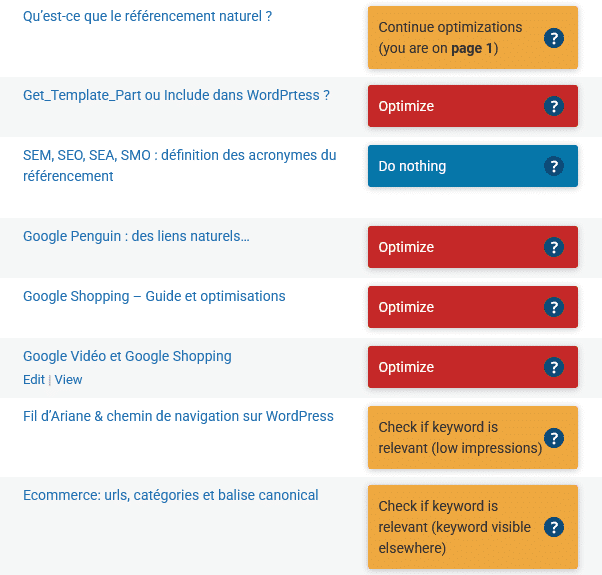Let’s take a look.
What is a keyword?
First of all, it’s important to understand what a keyword is .
It’s very simple: it’s simply the word, phrase, or expression that the user will type into the search engine.
So, our goal is to ensure that our website is visible when the user enters this term. For that to happen, your content must be relevant, it should talk about the keyword, address the user’s needs, and be unique.
The keyword in an SEO plugin
In all SEO plugins, you’re always asked to select a keyword.
Contrary to popular belief, adding a keyword in your WordPress SEO plugin won’t improve your content. It won’t give you more visibility or improve your text. Its primary purpose is to provide you with tailored advice to help you achieve your goals.
In SEOKEY, it also helps you gather real traffic data for your site on this keyword and provides an overview of all the keywords you want to work on in a dedicated admin menu.
How to choose the keyword to target?
A specific keyword
First and foremost, a good keyword is a term or expression that is easily understood and doesn’t require context. It should be explicit for everyone. Therefore, you should eliminate and avoid overly generic and imprecise terms.
For example, keywords like “beginner,” “quality,” “service,” or “cheap” are not specific enough for your SEO plugin to provide you with tailored advice.
You can address the user’s needs
Another key point is to prioritize targeting phrases for which you can provide a solution:
- You can sell a product;
- You can offer a service;
- A subscription could solve the user’s problem;
- And so on.
This also means that you need to make sure that the content you’ve written encourages users to use your services and products.
A keyword in your industry
Next, when you’ve created new content, it’s important to target terms and phrases that are in your industry and business sector. This means that you should not only target the names of your products or services but also any related themes. This will strengthen the semantics of your site.
It also allows you to position yourself upstream in the user’s journey. Take the example of a lawnmower seller. A specific keyword would be “buy a lawnmower.” However, you could also be present upstream of this issue, for example, with the phrase “How to care for your lawn?”.
Keyword evolution
Also, consider anticipating changes in demand for the keyword you want to target. For example, some keywords are highly seasonal, like “fireworks” or “Easter chocolate.”
Similarly, customer demand can change over the years. For instance, in France, 10 years ago, there was very little demand for no-contract mobile plans. Now, it’s become one of the main keywords in this industry.
A searched keyword
Search volume
Finally, an important factor to consider is what’s known as the search volume. This means that the targeted keyword should be used by internet users. If no one searches for this phrase, it won’t bring you any traffic, even if you rank first.
Many tools, including Google Adwords’ keyword planning tool, SEMRUSH, and Mangools, can provide you with this search volume.
The danger of search volumes
However, be cautious about tools that provide search volumes for a given phrase.
Firstly, the number provided is an average over the past 12 months. It doesn’t show seasonality. For example, the keyword “chocolate egg” is heavily searched for during Easter and much less in the middle of August.
The second issue is that tools can sometimes be imprecise in estimating the actual search volume, especially for less-searched keywords (e.g., less than 100 searches per month). In some cases, the tools may underestimate the actual search volume. So, a keyword with very low searches should not be automatically dismissed.
Furthermore, your primary goal is often conversion. Even with very low search volume, if you can convert 100% of your visitors, it can represent significant revenue.
The keyword in SEOKEY
When you add a keyword into our WordPress SEO plugin, it will first provide you with tailored advice in the audit on the editing page, just like in any other WordPress SEO plugin.
It will also offer more precise advice in the overall audit, where SEOKEY is the only plugin that gives you an overview of the issues related to all your content.
But we go further: adding the targeted SEO keyword will provide you with additional information in the keyword menu. As a reminder, SEOKEY displays all the keywords targeted throughout your website, along with the results in terms of clicks, impressions, and average position.
Lastly, and best of all, it allows us to change our primary recommendation. In SEOKEY, we provide a primary recommendation for each content you’ve published. Even if the audit suggests that you need to correct certain elements, the primary recommendation can guide you. For example, if you’re not visible at all for this keyword, SEOKEY will advise you to continue your optimizations. Conversely, if you’re already ranking first, our SEO extension will tell you not to make any changes.



